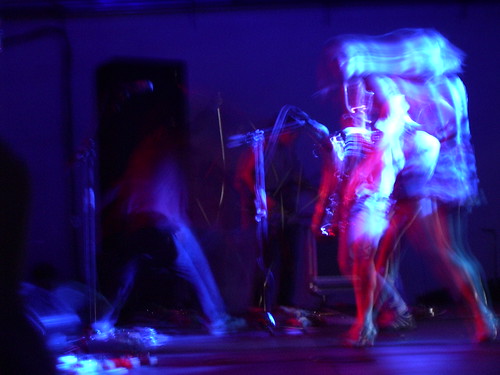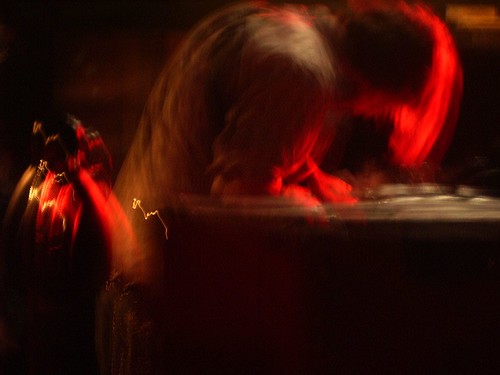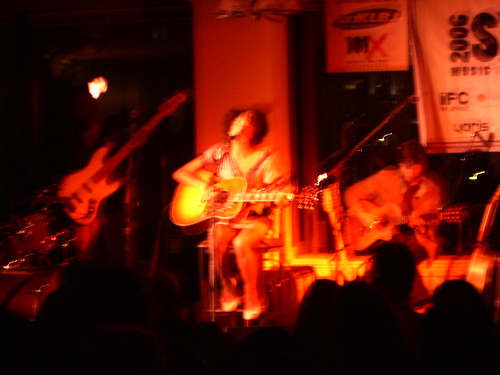[This feature ran in NME in 2000]
Welcome to the Hotel California (such a lovely place), a swanky Parisian hotel minutes from the
Dave, NME’s snapper, flashes away as E jokes about his jeans, which are gathering at the crotch and looking as if the immaculately-rendered oil nude hanging on the wall has him somewhat aroused. Jade, E’s make-up artist for the shoot, scurries over and straightens his trousers, as Dave tells E, who has been chatting about the controversial new John Lennon biography, that he looks very ‘Lennon-esque’.
“What, Lennon as he looks now?” snickers E, cracking what must be his fifth joke in as many minutes. “All decayed and rotten and stuff?” He coughs, and deadpans: “These dead-John Lennon jokes never go down well, why is that?”
This isn’t, perhaps, how you imagined E to be. Not the E whose sister committed suicide after years of mental illness, who nursed his mother through four years of terminal cancer, who chronicled these tragic events on the 1998 album ‘Electro Shock Blues’. Whither the dour Charlie Brown of post-Beck pop E is always painted as?
But then, for all the tragedy strewn across its sometimes-bleak tracks, ‘Electro Shock Blues’ is ultimately as poignant and uplifting as anything pop-music has achieved so far. And this tendency to write E off as some one-dimensional caricature of loss is evidence of a pop-cultural dumbing-down that Eels, along with kindred-spirits like The Flaming Lips, seem to be fighting a valiant, doomed battle against.
Sometimes E is happy. Sometimes E is sad. He’s a real person, and pop seems to have little stomach for real people anymore. Better the anaesthetised Friends-lite zombies currently choking music to death.
Yeah, E’s a funny motherfucker. As a brilliantly surreal interview with French station Radio Inter that afternoon proves (E using hilarious abstract nonsense to counter such thrilling questions as “What are your influencezzzzzzz”), he’s a dab hand at the kind of neurotic, self-parodising quick-wit Woody Allen exercised on his ‘earlier, funny’ movies. Indeed, his wisecracking is so constant that, if I were some amateur hack psychiatrist, I might suggest E used humour to hide his emotions.
E, who has spent much time and money on professional hack psychiatrists, agrees, to a degree.
“It’s a defence thing,” he admits, on the Eurostar taking us to
Right now, life’s ridiculousness is providing plenty of material for E’s humour. Smothering it, even. “The fun’s gone. The music industry sucks,” he spits, and it’s easy to see how his ambitions to make music with a resonance beyond gurning “Hooray for boobies” might lead to frustration. “There are very limited possibilities for a band like us at the moment. Its all ‘date-rape’ rock, Limp Bizkit and bands like that, angry white 17-year olds. It all seems pretty silly to me. We played Lollapalooza a few years back, we’d tell all the kids waiting to see Korn to go dance with each other.”
We’re supposed to be talking about ‘Daisies Of The Galaxy’ – Eels’ excellent latest album – yet the conversation can’t help but return to ‘Electro-Shock Blues’. Not least because its reception by the listening public – confusing at least as many as it seduced – speaks so much about E’s dissatisfaction with the pop industry and an audience whose attention spans are shrinking along with their emotional investment in music.
“I don’t think I’ll ever make a more uplifting record,” he reasons, “I guess that’s the opposite of what most people think it to be. It’s a sign of the times we’re living in, there’s no time to get into something as thoroughly as you’d need to, to ‘get’ ‘Electro-Shock...’. There’s so much information thrown at you now, we’ve all got such a capacity for trivial facts, but nobody can get into anything that’s deeper than that.”
Thing is, if you approach taboos like cancer and death with anything other than a po-faced seriousness, you confuse people. They don’t know if they should laugh at the jokes, if you’ve compromised the tragedy.
“Well, I’m from the ‘Nothing Is Sacred’ school of humour, to some degree. The song ‘Something Is Sacred’, on the new album, is about how you have to get to a point where something is sacred to you, but joking about dying is not sacred to me. If you know someone who’s dying of cancer, chances are they’ll joke about dying of cancer. Dressing up as undertakers for the ‘Electro-Shock...’ tour, printing tombstones on the sleeve reading ‘sing along at home’... It was so important for me to have fun with it, have that outlet, try and turn the whole experience into something beautiful.”
Such neutering concepts of ‘good-taste’ are an anathema to E, evidence of the trends currently demolishing what little integrity pop has left. Take the hypocrisy surrounding ‘It’s A Motherfucker’, off ‘Daisies...’. It’s E’s finest moment so far, a perfect 2-minutes of heartbreaking piano and musing on the pain of absence, a song E deadpans “Whitney Houston should cover”. But even NME can’t name it without ‘bleeping’ out some ‘offending’ letters.
“I don’t trust people who don’t use profanity. Everybody says ‘motherfucker’, but we all have to pretend we don’t. Fuck that! It’s a sweet song, a very real song, something that a lot of people can identify with, and maybe get some comfort from, but everyone’s upset about it. And no one blinks an eye about Britney Spears singing ‘I Was Born To Make You Happy’. That’s not such a great message for a little girl: ‘I was put on Earth to serve you’.”
And E takes a pretty Bill Hicks-ian view of musicians who sell their songs to advertising companies...
“It’s pretty much impossible to be an artist in the music industry, this is a terrible time for it. Look at how accepted it is to sell your songs to TV commercials. My job is to be an artist, not a car salesman. And the main reason bands put their music in commercials is to get heard, because you can’t get your songs on the radio or on MTV anymore. I get offers every week to use my songs in commercials, and my life would be a lot easier if I did. But I’ve got a fundamental problem with it. If it became a choice between singing about Taco Bell or working at Taco Bell, then maybe things would be different, but I can afford to pay my rent right now.
“A car company wanted to use ‘Mr E’s Beautiful Blues’,” laughs E, shaking his head in incredulity. “The first verse is about pollution! People aren’t thinking, and they’re certainly not listening.”
‘Daisies Of The Galaxies’ marks a fistful of fresh starts for E. He’s sold up his late mother’s house. He’s moved to Silverlake,
“It was all so English, in so many ways,” he reflects. “Very repressed, no-one said anything direct to each other that ever meant anything. My mother could never say ‘I love you’. And once my sister died, my mother started saying ‘I love you’ when she’d get off the ‘phone to me. It was a really hard, awkward thing for her to do, but it was very touching that she realised this was an important thing. Can you imagine your child committing suicide, and feeling ‘I should have said more’? It was terrible. But its never too late to try and make things better for those who are still alive.”
Once he had finished recording ‘Daisies Of The Galaxy’, E found himself totally alone in his new house with nothing to do for 3 months. He found himself flicking through a copy of Derek Humphry’s 1991 textbook, ‘Final Exit: The Practicalities of Self-Deliverance and Assisted Suicide For The Dying’. Light reading, then?
“I was cleaning out my mother’s house,” remembers E, “and this book, describing the most painless ways to end your life, was one of the last things I came across. I’d never seen it before, I guess she’d asked someone to get it for her, in case the pain got too bad. I took the book with me, thought it might come in handy [laughs]. Soon after, I was feeling real depressed. I started looking through the book...”
He coughs. “I was, y’know interested in what it had to say... And I saw this writing in the margins, and I realised, it was my sister’s handwriting. So I realised it was my sister’s book which my mother must’ve found, and it all came crashing down on me, how awful my whole family experience has been.”
Do you still have the book?
“Yeah, it’s in my bookcase at home. Like some fucked-up family heirloom; I’ll pass it on to my kids.”
The day E sold his dead mother’s house, he says, he finally felt like a man. “It was an amazing responsibility,” he marvels, “and a horrible thing to have to do. But now I know I can deal with something like that, survive it, ‘though I’m not always sure.
“The dust was settling, I’d closed up the house, what are my choices?” he remembers asking himself, that day. “I can either stay depressed, give up and become bitter, like a lot of people do. Or I can try and be more positive and look ahead, enjoy the few years I’ve got left before I die.” He chose the latter. Where, for so long, keeping it together for the immediate future was his only thought, he’s now looking further ahead, working on a movie soundtrack, wanting to record a ‘rock’ album.
“I hope you like all the extra material I gave you today,” he grins, as we clamber off the Eurostar at
(c) Stevie Chick 2000




1 comment:
Hotel California, I love this tune too.
Though I don't know well 'bout other Eagles' songs... :D
Post a Comment